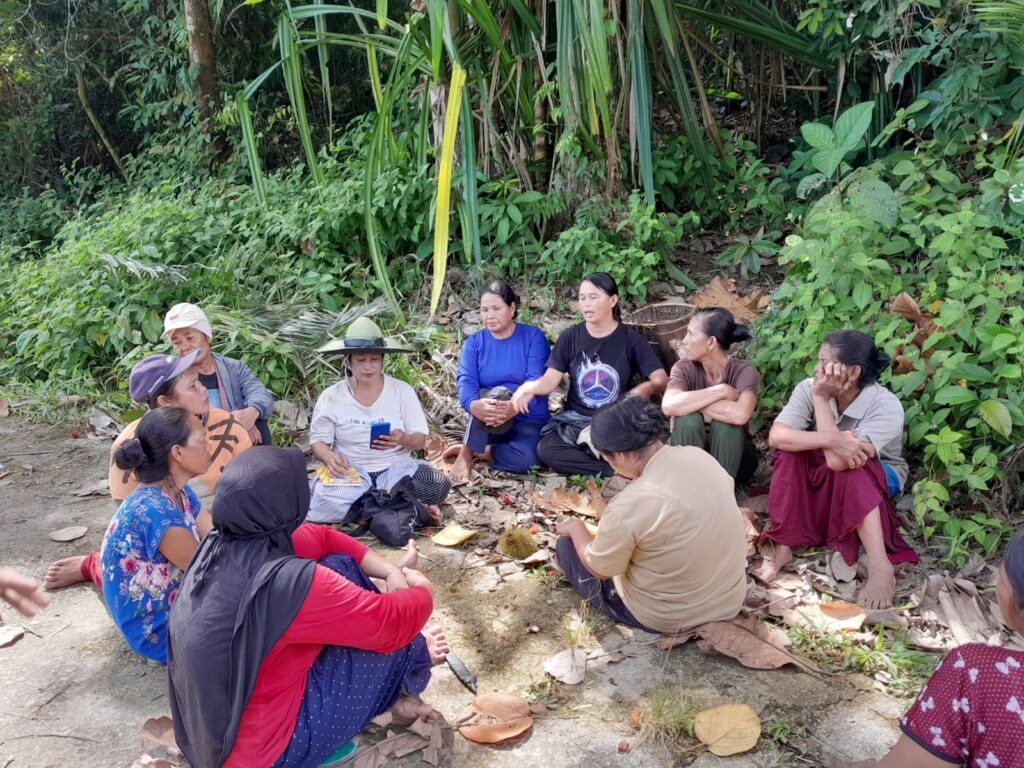The patriarchal culture in the Mentawai indigenous community places women as subordinates where their roles and positions are lower than men. This causes women to often experience discrimination and injustice, both in the domestic and public spheres. In decision-making forums in the household, mother (clan), society, even in hamlet and village government, women are rarely actively involved. As a result, the decisions made tend to only accommodate the needs and interests of men.
More concerning conditions are experienced by women and children with disabilities and female heads of households (widows). They are seen as weak people who cannot do anything and are only a burden on society and the government. This discrimination leads them to poverty and physical, psychological, and sexual violence. Cases of violence, especially sexual violence against women and children, are often ignored or covered up by families and the surrounding environment. One of the causes is the authority to handle cases according to custom that lies with men in the nuclear family and clan. This male dominance and authority makes victims powerless to determine and demand the justice they desire.
Women and children seem to have no authority over their bodies and souls. Handling of sexual violence cases tends to be resolved through customary and family means. Perpetrators who are found guilty in customary courts will be subject to customary fines (tulou) which is only material in nature. Tulou aims to restore the dignity of the victim's family and prevent prolonged conflict. Either between the perpetrator's family and the victim's family or only serves as social reconciliation. While the victim is "forced" to recover himself. This condition certainly should not be allowed to drag on. There must be efforts from all elements of society and government to reconstruct the customs, values, and culture of Mentawai. In order to provide justice and protection for women and children in the village.
YCMM together with the Village Governments in Muntei, Malancan, and Nemnem Leleu Villages have been compiling since 2023 draft Village Regulation on the Protection of Children and Women. Draft This is compiled based on the results of identifying potential and cases of violence against women and children. The process of identification and writing draft carried out in a participatory manner by involving women's groups, including groups of people with disabilities and survivors.
Draft This Village Regulation is also socialized and consulted with the public to get feedback from the community, including women's groups. YCMM facilitated public consultation activities in Malancan Village which were carried out on April 27 in Dusun Sirilanggai and May 2, 2024 in Dusun Sinaki. This activity involved women's groups who were quite enthusiastic about discussing draft This village regulation. In Dusun Sirilanggai, of the 22 discussion participants, 9 of them were women who actively provided opinions on each existing article.
Meanwhile in Sinaki Hamlet, out of 21 participants, 17 of them were women. They strongly support the immediate issuance of this Village Regulation so that cases of sexual violence can be suppressed as much as possible and handled with the principle of justice for victims.
Margareta, a female head of household, said that Malancan Village can be said to be in a state of emergency regarding sexual violence. She is very concerned about the increasing cases of sexual violence against children which has resulted in high school dropout rates. Rindi, a young woman from Sinaki Hamlet, said that if there is no firm policy from the village government, the future of Malancan's young generation will be threatened.
Draft This village regulation regulates the implementation of child and women's protection in the village. Where the village government has the responsibility and authority to encourage the handling of sexual violence cases to the realm of state law. The goal is to create a deterrent effect on the perpetrators and a sense of justice and protection for the victims. Customary law can still be implemented as restitution for victims. The government also guarantees community participation to be involved in efforts to create a friendly environment for women and children. As well as preventing acts of violence.
The women who took part in the public consultation said they were happy to have been involved in the discussion. draft Village Regulation. Where it specifically accommodates the interests and needs of women for a sense of security and justice. Women's voices should be heard. They also hope for the birth of other policies that can empower women's groups in development. By involving and encouraging the active role of women in the policy formulation process, women can be more empowered and have an important role in determining policies that directly affect their lives.
The strong patriarchal culture in the Mentawai indigenous community does place women in a position that is vulnerable to discrimination and injustice. However, with efforts such as those made by YCMM together with the village government, there is great hope for change. The preparation and implementation of village regulations that protect women and children is a concrete step towards gender equality and justice.
The active participation of women in this process shows that they have a voice and an important role in creating a safer and more equitable environment for all. Collective efforts from all elements of society and government are needed to reconstruct values and culture to be more inclusive and protect the rights of women and children in Mentawai.


